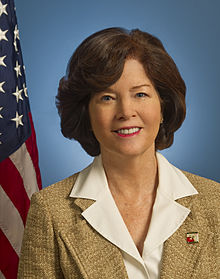Colleen Hartman

Dr. Colleen Hartman is the deputy center director for Science, Operations and Performance of NASA’s Goddard Space Flight Center[1][2][3] and is the Acting Director of the Science and Exploration Directorate (Code 600). Previously she was a presidential management intern, served as a senior policy analyst at the White House Office of Science and Technology Policy, and served as deputy division director for technology at NASA Headquarters.[4]
Hartman earned a bachelor's degree in zoology from Pomona College in Claremont, Calif., a master's in public administration from the University of Southern California, and a master's, as well as a doctorate, in physics from the Catholic University of America in Washington.
Hartman has spoken both domestically and internationally at innumerable press events, including serving as the NASA press interface for many outer planets missions and launches. Her numerous awards include the Presidential Rank Award of Meritorious Senior Executive, the NASA Outstanding Performance Award, the Claire Booth Luce Fellowship in Science and Engineering, and the Hugh L. Dryden Memorial Space Club Award, and multiple NASA awards.
History
Hartman has served in various senior positions throughout the government, including as acting associate administrator and as the deputy associate administrator at NASA's Science Mission Directorate and as the deputy assistant administrator at the National Oceanic and Atmospheric Administration. Hartman was professor of space policy and international affairs at the George Washington University's Elliott School of International Affairs in Washington and continues to serve as an adjunct professor. As division director for NASA's planetary missions,[5] Hartman was instrumental in developing innovative approaches to powering space probes destined for the farthest reaches of the Solar System, including in-space propulsion and nuclear power and propulsion. While at NASA Headquarters, she spearheaded the selection process for the New Horizons probe to Pluto.[6] She also gained administration and congressional approval for an entirely new class of funded missions that are competitively selected called "New Frontiers," to explore the planets, asteroids and comets in the Solar System.[7]
After beginning her government career as a presidential management intern, she worked on Capitol Hill, as a senior engineer at NASA Goddard, as a senior policy analyst at the White House Office of Science and Technology Policy, and as deputy division director for technology at NASA Headquarters. Hartman has built and launched scientific balloon payloads, worked on robotic vision, overseen the development of the command and data handling systems for a variety of Earth-observing spacecraft, and served as NASA program manager for dozens of missions, the most successful of which was the Cosmic Background Explorer. Data from the COBE spacecraft gained two NASA-sponsored scientists the Nobel Prize in physics in 2006.[8]
References
- ^ "NASA - Dr. Colleen Hartman Appointed Deputy Director for Science, Operations and Program Performance at Goddard". Nasa.gov. 2012-07-10. Retrieved 2014-04-30.
- ^ "Colleen Hartman '77 Promoted to Deputy Director at NASA's Goddard Space Flight Center - Pomona College". Pomona.edu. 2012-07-11. Retrieved 2014-04-30.
- ^ "Dr. Colleen Hartman Appointed Deputy Director For Science, Operations and Program Performance... - GREENBELT, Md., July 10, 2012 /PRNewswire-USNewswire/". Prnewswire.com. 2012-07-10. Retrieved 2014-04-30.
- ^ Richard Luscombe, Cape Canaveral. "Mars rover Curiosity poised for Nasa's 'most ambitious' mission to planet | Science". The Guardian. Retrieved 2014-04-30.
- ^ Dunn, Marcia. "NASA launches 'monster truck'-sized rover, Curiosity, to Mars". Gwinnett Daily Post. Retrieved 2014-04-30.
- ^ "NASA Sets Launch Coverage Events for Mission to Jupiter | Mission Juno". Missionjuno.swri.edu. Retrieved 2014-04-30.
- ^ "NASA launches super-size Mars rover – USATODAY.com". Usatoday30.usatoday.com. 2011-11-26. Retrieved 2014-04-30.
- ^ "The Nobel Prize in Physics 2006". The Royal Swedish Academy of Sciences. 2006-10-03. Retrieved 2011-08-23.
External links
- Official NASA bio
- Colleen Hartman on C-SPAN on June 23, 2003 talking about the unmanned U.S. mission to Mars and science experiments to be conducted.
- Goodbye Galileo - What do you do with a dying space probe? That was the question facing Dr. Colleen Hartman '77 at NASA in the summer of 2003 - Pomona College Magazine, Spring 2004, Volume 40, No. 3
